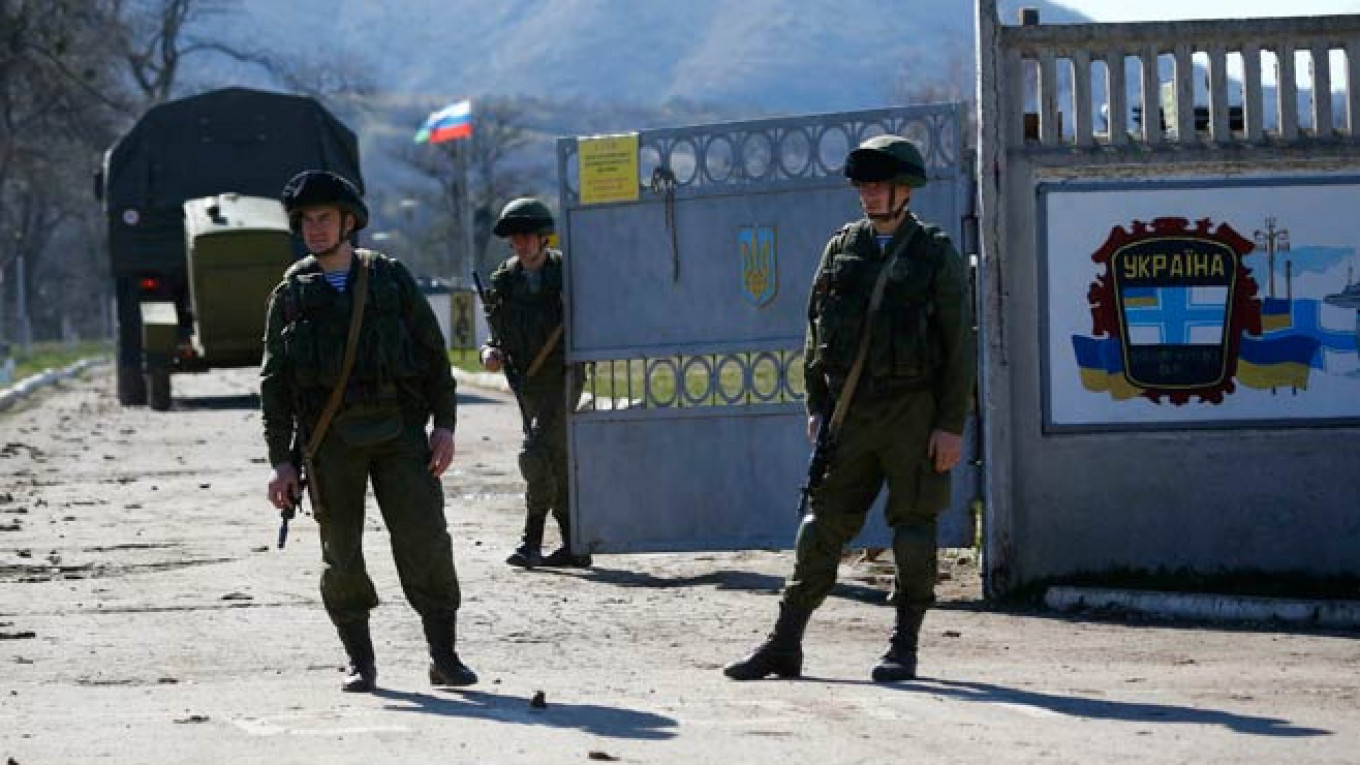The catchphrase "polite people," a term used to describe the unidentified but gentlemanly soldiers who occupied Crimea before the Russian annexation, has gone from Internet meme to sought-after trademark, with the Defense Ministry's own uniform and foodstuffs supplier among contenders for rights to the phrase.
The Defense Ministry-run Voentorg applied for a patent for the trademark Polite People on April 11, but was beaten to the punch by three other applicants, RBC reported, citing the database of the Federal Service for Intellectual Property.
The Internet meme "polite people" was born in February, when armed men seized strategic locations on the Crimean peninsula, following the impeachment of Ukraine's pro-Russian President Viktor Yanukovych by the newly installed opposition government.
The mens' camouflage, equipment and accents indicated that they were Russian soldiers, but Moscow at the time denied that they had sent in troops.
Crimeans, at a loss for how to describe their new guests, simply described the men as "polite people."
The term took off in the Russian Internet and rose to even greater popularity when President Vladimir Putin took an apparent liking to it, using it to joke about international sanctions against Russian officials and businessman with close ties to the Kremlin.
"I think that [the sanctioned Russians] are these 'polite people' in camouflage with machine guns," Putin told state television channel RT with a smile in an interview in late March.
The president finally stated during a phone-in last Thursday that the men were, indeed, Russian soldiers.
The database does not specify what type of goods Voentorg is seeking the trademark for, and the company on Friday did not respond to requests for comment.
"Even though today it is just a PR slogan, Polite People is one of the brightest examples of Russian branding," said Alexander Zhurbenko, managing partner of Moscow-based branding agency Brand Brothers.
Every brand is born in a consumer insight, Zhurbenko said, and "in the case of Polite People, the insight may be the emotional need that Russians have to express their patriotism and feel involved in the events of recent months."
Voentorg is not the only company eying the Polite People trademark. Three earlier applicants also applied to Rospatent for the rights to the phrase, and under Russian law, the first applicant has priority.
Entrepreneur Roman Yeremyan presented himself as owner of the trademark in an interview with Izvestia last week. His company Viva Group plans to release a line of T-shirts bearing the logo "polite people" over images of heavily armed soldiers.
The shirts will go on sale within the week in Crimea and eastern Ukraine and ultimately come to Russia as well, Yeremyan said.
He has no plans to try his luck in largely pro-European western Ukraine, however, where the brand would illicit "negative feelings," he added.
A lawyer representing the two other co-applicants, Ukrainian Vasily Petukhov and Russian Mikhail Semchenko, told RBC that he could not disclose his clients' trade secrets but that they were considering printing T-shirts with the logo, among other possibilities. Petukhov and Semchenko also applied for the right to use the phrase as the name for a nongovernmental organization.
But no matter the popularity it has drummed up in recent weeks, the ultimate resonance of the phrase has yet to be determined.
"To a great extent, the success of this brand in commercial markets will be defined by the outcome of the conflict in Ukraine. It might just as well become very successful and positive as acquire a highly negative image," Zhurbenko said.
Contact the author at [email protected]
A Message from The Moscow Times:
Dear readers,
We are facing unprecedented challenges. Russia's Prosecutor General's Office has designated The Moscow Times as an "undesirable" organization, criminalizing our work and putting our staff at risk of prosecution. This follows our earlier unjust labeling as a "foreign agent."
These actions are direct attempts to silence independent journalism in Russia. The authorities claim our work "discredits the decisions of the Russian leadership." We see things differently: we strive to provide accurate, unbiased reporting on Russia.
We, the journalists of The Moscow Times, refuse to be silenced. But to continue our work, we need your help.
Your support, no matter how small, makes a world of difference. If you can, please support us monthly starting from just $2. It's quick to set up, and every contribution makes a significant impact.
By supporting The Moscow Times, you're defending open, independent journalism in the face of repression. Thank you for standing with us.
Remind me later.






